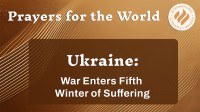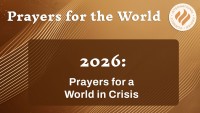As the conflict between Ukraine and Russia approaches its fifth year, the war continues to impose catastrophic human and infrastructure costs across Ukraine. Russian drone and missile attacks have persisted, targeting residential areas, energy grids, and civilian infrastructure, causing deaths, injuries, and widespread blackouts — especially in eastern and southern regions. Most recently, several attacks resulted in multiple civilian deaths, including strikes in Odesa and Kharkiv, highlighting that violence still falls heavily on non-combatants.
Healthcare and humanitarian systems remain under extreme strain. The World Health Organization has launched a 2026 emergency appeal, seeking tens of millions of dollars to protect access to essential health services for hundreds of thousands of people despite continual attacks on hospitals and clinics. Nearly 3,000 verified assaults on medical facilities since 2022 have weakened care and heightened vulnerability among displaced families.
Diplomatic efforts continue but remain fragile. Trilateral peace negotiations involving the United States, Ukraine, and Russia took place in Abu Dhabi earlier this year in an attempt to break the deadlock, though key territorial disputes and security guarantees remain unresolved. These talks yielded the release of hundreds of prisoners but no ceasefire agreement, and Western sanctions packages against Russian energy and financial networks have expanded.
Meanwhile, both sides are reshaping military strategies amid grinding frontline stalemates. Casualty figures remain high, with heavy losses reported on both sides as positional warfare and attrition continue to characterise the conflict.
The human cost persists: millions remain internally displaced, energy shortages are widespread during winter, and children’s education and healthcare access continue to be disrupted. This prolonged war presses deeply on families and communities across Ukraine.
Prayer Pointers
1. Pray for Ukrainian Civilians and Vulnerable People
Pray for protection, comfort, and provision for Ukrainian civilians enduring continued attacks, displacement, and hardship. Ask God to guard families, especially the elderly, children, and those without shelter or basic services, and to fortify aid delivery in the face of violence and winter weather.
“God is our refuge and strength, an ever-present help in trouble.” — Psalm 46:1
2. Pray for Peace, Wisdom, and Restraint
Pray that global leaders, mediators, and negotiators would be filled with wisdom, restraint, and courage to pursue peace rather than escalation. Ask God to open hearts to reconciliation, strengthen diplomatic efforts, and dismantle pride and fear that fuel conflict and delay peace.
“Blessed are the peacemakers, for they shall be called children of God.” — Matthew 5:9
3. Pray for Healing of Minds and Bodies
Pray for physical healing, mental resilience, and emotional restoration for those wounded, traumatised, or living in fear. Ask God to comfort the grieving, strengthen healthcare workers, and provide resources to care for the sick, displaced, and those suffering from loss.
“He heals the brokenhearted and binds up their wounds.” — Psalm 147:3
Father God, be shelter and strength for Ukraine’s people. Guard the innocent, guide peacemakers, and bring healing to broken lives. Turn hearts toward peace, uphold mercy over vengeance, and let justice and hope rise above the gloom of war. Amen.
More Information
* WHO Humanitarian Appeal for Ukraine 2026
https://www.who.int/europe/news/item/06-02-2026-ukraine–who-seeks-us-42-million-in-2026-to-protect-health-care-as-war-enters-fifth-year 
* Al Jazeera – Key developments in the Russia-Ukraine war
https://www.aljazeera.com/news/2026/2/8/russia-ukraine-war-list-of-key-events-day-1445 
* Peace Negotiations in the Russo-Ukrainian War
https://en.wikipedia.org/wiki/Peace_negotiations_in_the_Russo-Ukrainian_war_%282022%E2%80%93present%29 
[1:15 pm, 9/2/2026] Andy Page: Page 3 - Shine! In Intro letter… Please remove apostrophe from it’s - so just ‘its’
We will be praying for the vision of 2BC, for children and youth across Indonesia and for the success of the Light of the World movie and it’s
Gospel vision.
Sudan’s civil war - now marking over 1,000 days of relentless conflict between the Sudanese Armed Forces (SAF) and the Rapid Support Forces (RSF) has plunged the nation into one of the world’s most acute humanitarian crises. Millions of civilians have been killed, displaced, or driven into life-threatening hunger amid grinding warfare across multiple fronts. Recent reports from the United Nations and humanitarian organisations describe Sudan as the site of the largest displacement and hunger crisis on Earth.
The collapse of public services including health care, clean water, and food systems, has compounded suffering. The World Food Programme warns that more than 21 million people now face acute hunger, with confirmed famine in regions such as Darfur and Kordofan, and the risk of famine spreading further where access remains blocked by insecurity. Funding shortfalls have placed lifesaving aid at risk of running dry unless urgent contributions are made.
Civilians, especially women and children, endure frequent attacks, siege conditions, and widespread abuses, including sexual violence and violations of international humanitarian law. Aid delivery continues to be dangerous and inconsistent due to blocked roads, collapsed infrastructure, and shifting battle lines. The International Rescue Committee reports that humanitarian funding has collapsed by nearly half, even as needs escalate.
Displacement is staggering: millions are internally uprooted while others seek refuge in neighbouring countries such as Chad, South Sudan, and Egypt, overwhelming fragile border communities. The crisis is a stark testament to the human cost of unending warfare, marked by hunger, disease, and relentless insecurity.
Prayer Pointers
1. Pray for Protection of Civilians
Pray for women, children, and families caught in the crossfire, whose paths are uncertain. Ask God to be their stronghold and shield, to guard them from bombardment, abuse, and displacement. Pray for His supernatural presence to encircle refugee camps and frontline communities, and that hearts everywhere would rise in compassion to meet their urgent needs.
“God is our refuge and strength, an ever-present help in trouble.” Psalm 46:1
2. Pray for Humanitarian Access and Provision
Pray that life-saving aid - food, clean water, medicine, and shelter would reach those who hunger and thirst for relief. Ask God to open safe passages for aid workers, replenish dwindling resources, and stir a global wave of generosity that sustains Sudan’s people even in the face of insecurity, blocked routes, and scarce funding.
“He satisfies the thirsty and fills the hungry with good things.” Psalm 107:9
3. Pray for Peace, Justice, and Wise Leadership
Pray that leaders, mediators, and international partners would pursue peace with integrity, wisdom, and mercy. Ask God to expose injustice, soften hardened hearts. Pray that ceasefires hold, negotiations bear fruit, and every choice honours the dignity of human life above politics or pride.
“Blessed are the peacemakers, for they shall be called children of God.” Matthew 5:9
Summary Prayer
Lord of compassion and justice, shelter Sudan’s innocent and provide for those in desperate need. Strengthen those who serve faithfully, guide leaders with wisdom, and move the world to act courageously, mercifully, and with enduring care. Amen.
More Information:
- UN Office for the Coordination of Humanitarian Affairs – Sudan
https://www.unocha.org/sudan (unocha.org) - World Food Programme – Sudan Emergency
https://www.wfp.org/emergencies/sudan-emergency (wfp.org)
• UNICEF & OCHA – 1,000 days of war briefing
https://www.who.int/news/item/09-01-2026-sudan-1000-days-of-war-deepen-the-world-s-worst-health-and-humanitarian-crisis (who.int)
Iran is facing a convergence of severe internal and external pressures as economic collapse, political repression, and escalating regional tensions unfold simultaneously. Inside the country, inflation remains extremely high, the national currency has continued to lose value, and the cost of food, fuel, and housing has placed unbearable strain on ordinary families. Sanctions, economic mismanagement, and reduced oil revenues have left millions facing insecurity and hardship.
Public protests, often led by young people and women, have re-emerged across multiple cities, driven by unemployment, corruption, and restrictions on personal freedoms. Human rights organisations report mass arrests, intimidation, internet shutdowns, and the use of force to suppress dissent. Communication blackouts and surveillance have further isolated communities and obscured the scale of unrest.
At the same time, regional instability has intensified. The United States has repositioned a naval battle group into the region, placing significant military assets within striking distance of Iran amid heightened rhetoric and warnings. Officials describe the move as a deterrent, yet analysts caution that such deployments increase the risk of miscalculation, escalation, or unintended confrontation particularly while Iran is already under profound internal strain.
For civilians, the combination of economic collapse, repression, and the threat of military conflict deepens fear and uncertainty. Any escalation would likely worsen humanitarian suffering, disrupt vital infrastructure, and further isolate the population. Yet even amid pressure and fear, many Iranians continue searching for truth, hope, and meaning. Underground Christian communities persist quietly, often at great personal cost.
Scripture reminds us that God is near to the crushed in spirit and hears the cries of the oppressed, even when nations tremble.
Prayer Pointers
1. Pray for Protection of Civilians Amid Unrest and Tension
Pray for families living under economic strain, fear, and uncertainty. Ask God to be their refuge and strength, providing daily needs and sustaining hope. Pray that courage and perseverance rise in hearts, for those quietly seeking truth and justice.
“The Lord hears the needy and does not despise his captive people.” Psalm 69:33
2. Pray for the Right to Peaceful Expression
Pray for Iranians peacefully voicing their hopes and frustrations, seeking justice and accountability. Ask God to safeguard demonstrations, move hearts toward restraint, and inspire leaders to listen with humility. Pray for safe advocacy, respect for human dignity, and that change comes through peaceful, righteous means.
“Blessed are the peacemakers, for they shall be called children of God.” Matthew 5:9
3. Pray for Spiritual Awakening and Courage
Pray for spiritual awakening across Iran, that hearts would encounter Christ’s truth, peace, and freedom amid hardship. Ask God to strengthen underground believers, protect prayer networks, and awaken courage, hope, and faith where fear and repression seek to silence truth.
“You will know the truth, and the truth will set you free.” John 8:32
Summary Prayer
God of justice and mercy, watch over the people of Iran. Protect the vulnerable, sustain peaceful change, and guide leaders with humility and wisdom. Let freedom, truth, and compassion shine, and may Your purposes of peace and hope prevail over fear, oppression, and despair. Amen.
More Information:
- IMF – Iran country economic overview
https://www.imf.org/en/Countries/IRN - Human Rights Watch – Iran protests and crackdown
https://www.hrw.org/middle-east/north-africa/iran - UN OHCHR – Human rights situation in Iran
https://www.ohchr.org/en/countries/iran
As 2026 unfolds, the world faces a convergence of humanitarian, geopolitical, and economic crises that are stretching societies, governments, and aid systems to their limits. According to the United Nations, well over 300 million people now require urgent humanitarian assistance, the highest level ever recorded - driven by conflict, climate-related disasters, displacement, and economic breakdown.
Armed violence continues to fuel hunger and mass displacement in multiple regions, including Sudan, Gaza, Yemen, eastern Democratic Republic of the Congo, Haiti, and parts of the Sahel. The World Food Programme warns that conflict remains the primary driver of acute food insecurity, with supply routes disrupted, farmland abandoned, and aid access increasingly restricted. Millions of children are at risk of severe malnutrition, with long-term consequences for entire generations.
At the same time, global instability is rising. Strategic analysts and conflict-monitoring organisations warn that unresolved flashpoints, militarisation, and hardened rhetoric between regional and global powers heighten the risk of escalation through miscalculation. Economic pressures intensify these dangers. The World Bank reports growing debt distress, persistent inflation, and widening inequality, hitting the poorest communities hardest and undermining fragile states.
Climate shocks, floods, droughts, heatwaves, and storms further compound vulnerability, particularly in countries least equipped to respond. Together, these overlapping crises reveal the fragility of human systems and the deep interconnectedness of global suffering.
Scripture reminds us that creation groans under the weight of brokenness, yet God remains sovereign over nations and history. This moment calls the Church to watch and pray. Not only for relief, but for repentance, justice, restraint, and the mercy of God to break into a wounded world.
Prayer Pointers
1. Pray for Civilians in Conflict and Crisis
Pray for men, women, and children caught in the chaos of war, disaster, and humanitarian emergencies. Ask God to protect, provide, and sustain hope where suffering feels unending. Pray especially for the vulnerable, the young, the elderly, and those uprooted. That they would know God as a refuge and strength in every storm.
“God is our refuge and strength, an ever-present help in trouble.” Psalm 46:1
2. Pray for Provision Amid Hunger and Displacement
Pray that food, clean water, shelter, and aid would reach nations facing hunger and mass displacement despite insecurity, funding gaps, and political barriers. Ask God to open safe pathways for relief workers, strengthen those who serve in dangerous conditions, and stir generosity in governments, churches, and meet urgent needs with compassion and consistency.
“He satisfies the thirsty and fills the hungry with good things.” Psalm 107:9
3. Pray for Wisdom and Humility Among Global Leaders
Pray that global leaders would walk in humility, restraint, and clarity as tensions rise and decisions ripple across nations. Ask God to guard hearts against pride, fear, and aggression, guiding leaders toward diplomacy. Pray that courage would take the form of mercy, foresight, and protection of human life.
“Pride goes before destruction, a haughty spirit before a fall.” Proverbs 16:18
Summary Prayer
Father God, be our refuge in a wounded world. Feed the hungry, shelter the displaced, and protect the innocent. Break the pride that fuels conflict, grant leaders’ humility and wisdom, and let Your justice, mercy, and peace shine brighter than fear and despair. Amen.
More Information:
- UN Global Humanitarian Overview
https://www.unocha.org/global-humanitarian-overview - World Food Programme – Global Hunger Crisis
https://www.wfp.org/global-hunger-crisis - Council on Foreign Relations – Global Conflict Tracker
https://www.cfr.org/global-conflict-tracker
We invite you to join millions of believers from churches and Christian ministries around the globe, as we unite for 24-hours of prayer for Buddhist Peoples.
This will be an opportunity to pray together, exalting Jesus Christ as King throughout the Buddhist world, asking the Lord of the Harvest to send forth laborers to every unreached Buddhist people group!
We have produced a Prayer Guide that is available in multiple languages online HERE
We are encouraging everyone to pray where they are - at home, at church, at cell groups, at work or in houses of prayer! Pray solo, in couples, as families, and devote some time in worship and prayer, upholding Buddhist peoples in 7 key cities and regions of the world.
 Our Global Family 24-7 Prayer community will be praying with us across the 24 hours.
Our Global Family 24-7 Prayer community will be praying with us across the 24 hours.
Register to join Global Family 24-7 online HERE
Jason’s friend, Jon Shabaglian, leader of Psalmist Mission has written an awesome anthem for the Day of Prayer entitled ‘Tsunami’. This inspirational worship song will be launched on the Global Day of Prayer!
Let's be praying for Kingdom breakthrough across these key Asian cities, the USA and the wider Buddhist diaspora!
This will be the first of our 5 worldwide days of prayer for 2026! – Watch this Intro Video!
The ‘Until the Light Breaks Through’ 7-Day Prayer Guide for Buddhist Peoples is designed to help individuals, families, prayer groups, and churches engage meaningfully in prayer for Buddhist peoples in the week leading up to the Global Day of Prayer for Buddhist Peoples on 17 February 2026.
It offers both biblical depth and practical structure, making it easy to use whether you have five minutes or an extended time set aside for intercession.
The guide is arranged as a day-by-day journey, covering seven locations and themes across Asia and the global Buddhist diaspora.
Each day focuses on a real place, real people, and a real story, helping prayers move beyond statistics to compassion-filled, informed intercession.
The journey includes Bhutan, Laos, Thailand, Japan, Northeast India, Myanmar, and the Buddhist diaspora in Los Angeles, with links to 110 Cities and Prayercast resources to encourage continued prayer throughout the year .
Each daily section follows a consistent and easy-to-navigate format:
- A short context-setting story or testimony showing how God is at work among Buddhist peoples
- Key prayer points focused on discipleship, family life, compassion, breakthrough, and Gospel access
- Selected Bible passages to anchor prayer firmly in Scripture
- A brief personal application question, inviting reflection and obedience
- A highlighted city focus, connecting local stories to God’s wider mission in the world
This structure allows the guide to be used flexibly. It works well for personal daily devotion, family prayer times, small groups, or corporate prayer gatherings. Some may choose to pray through one section each day, while others may use the stories and prayer points as a framework for longer worship-based prayer sessions.
The guide also intentionally prepares hearts for the Global Day of Prayer, helping intercessors build faith, understanding, and spiritual momentum. Rather than focusing on religious systems, it highlights Jesus’ love, compassion, power, and sufficiency, calling believers to pray with hope and confidence.
Ultimately, this guide is an invitation to stand with God’s heart for Buddhist peoples—believing that as the Church prays, the light of Christ will continue to break through homes, families, cities, and nations.
‘Until the Light Breaks Through’ has been published in 30+ languages (online), and is available for free, from the 110 Cities website.
 The IPC Media Team have published a companion Childrens Guide entitled Listen - Live – Love that includes songs, daily stories and ‘Justin’s Thoughts’ written by Justin Gunawan.
The IPC Media Team have published a companion Childrens Guide entitled Listen - Live – Love that includes songs, daily stories and ‘Justin’s Thoughts’ written by Justin Gunawan.
This colourful Children’s Prayer Guide for Buddhist Peoples invites children aged 6–12 on a seven-day prayer journey around the world, meeting real-life children and families living in Buddhist cultures.
Each day focuses on a different place—such as Bhutan, Laos, Thailand, Japan, India, Myanmar, and the Buddhist diaspora—using engaging stories, simple explanations, prayer points, Bible verses, and fun language activities.
Children learn what daily life is like, what people believe, and why knowing Jesus matters.
Families can use the guide together at breakfast, bedtime, or family prayer time—reading a story, learning a new word, praying short prayers, and asking God to show His love to others.
It works brilliantly for family devotions, children’s groups, or individual reading, helping children grow in compassion, faith, and confidence to pray big prayers together for the Buddhist world.
Read and download Listen – Live – Love in multiple languages HERE
Join Us Anytime: A Year of Daily Prayer Rooted in God’s Word
It’s never too late to say YES to prayer!
Wherever you are in the year, we invite you to join believers around the world in a simple but powerful daily rhythm: praying God’s Word into real-life situations across the nations.
In partnership with YouVersion, we’re inviting you to take part in Praying God’s Word: A 365-Day Guide for the World — a Scripture-based prayer journey you can begin today, not just at the start of the year.
This flexible, year-long plan guides you day by day through the Bible while focusing your prayers on frontline workers and communities in 110 strategic gateway cities across some of the least-reached regions of the world.
Each day includes a short Bible passage, a specific person or team to pray for, and a clear, faith-filled prayer that connects God’s Word to what’s happening on the ground right now.
As you pray, you’ll be standing with those who are sharing the Gospel, translating Scripture, planting churches, making disciples, and serving the poor and broken — often in challenging and unseen places. It’s an invitation to align your daily devotional life with God’s global mission and to let Scripture shape your prayers for the nations.
 Whether you commit to praying every day or simply start where you are, your prayers matter. Together, as thousands unite around God’s Word, we believe the Holy Spirit will bring encouragement, breakthrough, and lasting fruit.
Whether you commit to praying every day or simply start where you are, your prayers matter. Together, as thousands unite around God’s Word, we believe the Holy Spirit will bring encouragement, breakthrough, and lasting fruit.
Start the 365-day plan today – Click, or scan the QR Code
[https://www.bible.com/reading-plans/64200-365-prayers-to-change-the-world](https://www.bible.com/reading-plans/64200-365-prayers-to-change-the-world)Thank you for lifting up Jesus among the nations and for walking with us in faithful, strategic prayer — one day at a time.
By Tom Victor
Shine! 24 Hours – Raising Up 2BC Champions
Tuesday 10 February 2026 | Praying with and for Indonesia
“Rise, shine, for your light has come, and the glory of the Lord rises upon you.” (Isaiah 60:1)
Shine! is more than a 24-hour prayer event. At its heart, Shine! is about children and young people becoming 2BC Champions — learning to hear the voice of their Heavenly Father, discovering who they are in Christ, and confidently sharing God’s love with their friends and families.
 This focus is shaping everything we do through the 2BC movement.
This focus is shaping everything we do through the 2BC movement.
1️⃣ Shine! Begins with Children Becoming 2BC Champions
The first purpose of Shine! is discipleship and identity. Through child-led worship, prayer, creativity and Scripture, children are encouraged to:
- Listen to God’s voice
- Grow secure in their identity as God’s beloved children
- Step out in simple, faith-filled ways to share Jesus’ love
Shine! creates a safe, joyful space where children lead, families participate, and faith becomes something lived — not just talked about.
2️⃣ Praying for Children in the World’s Most Populous Nations
Each Shine! event also carries a clear global prayer focus.
On Tuesday 10 February 2026, we will be praying especially for children and young people across Indonesia — one of the most populous nations on earth.
Together, children around the world will pray that Indonesian children:
- Encounter Jesus personally
- Are surrounded by godly families and communities
- Grow up knowing hope, purpose and God’s love
This is children praying for children — heart to heart, nation to nation.
 3️⃣ Praying for the Light of the World movie to Reach Families Everywhere
3️⃣ Praying for the Light of the World movie to Reach Families Everywhere
Finally, we will continue to pray for the global impact of the beautifully hand-drawn animated film Light of the World, created to share the Gospel of Jesus with children and families worldwide.
The film is being translated into scores of languages and released across many nations, with a clear Gospel invitation and free discipleship resources. It is a powerful tool to help children grow as 2BC Champions — knowing Jesus and making Him known.
Join the Shine! Zoom Call!
Shine! runs for 24 hours, with participation of children and young people across multiple nations, including:
- Online prayer hours
- Offline family, church and small-group gatherings
- Free Shine! resources including Prayer Guides, B.L.E.S.S. cards and worship songs
You can join for an hour, or host your own gathering at home or church.
If you are a child… love children… or were once a child — Shine! is for you.
See the extremely encouraging summary of recent feedback from Shine! Participants HERE
Find out more, access resources, and sign up:
www.2bc.world/shine
2BC — Every Child. Everywhere. On Mission. With God.
Prayer is at the heart of the Christian life — yet many believers quietly wonder if they are really praying effectively. Why do some prayers seem to shape history, while others feel unfocused or weary? How do we persevere in prayer when answers are delayed, opposition is strong, or the world feels overwhelming?
The 7 Keys to Effective Prayer podcast series is an invitation to rediscover prayer as God intended it: rooted in Scripture, sustained by faith, and aligned with His purposes for the nations.
Hosted by Dr. Jason Hubbard, Director of International Prayer Connect, this seven-part teaching series draws on biblical foundations, historic prayer movements, and decades of experience mobilising prayer around the world. Jason brings clarity, depth, and pastoral warmth as he explores seven essential principles that help believers pray with confidence, persistence, and purpose.
These teachings are inspired in part by the remarkable legacy of the Moravian community at Herrnhut, Germany, led by Count Zinzendorf — a movement where believers committed to continuous, day-and-night prayer for over one hundred years, sparking extraordinary missionary fruit across the nations. Their story reminds us that when prayer is anchored in God’s heart, sustained over time, and shared by a community, it becomes a powerful force for spiritual transformation.
Each episode focuses on one key, offering biblical insight and practical encouragement for personal and corporate prayer:
The Seven Keys
- Worship Based Prayer
- Abiding in Christ
- Asking in Jesus’ Name
- Praying God’s Word
- Breakthrough Prayer
- Desperate Prayer
- Unceasing Prayer
The 7 Keys to Effective Prayer podcast launches on 1 March 2026, with new episodes released weekly. Listeners are encouraged not only to listen, but to reflect, apply, and allow the Holy Spirit to deepen their own prayer lives.
Our prayer is simple: that through this series, believers around the world will be freshly equipped to pray — faithfully, biblically, and expectantly — and to see God move in ways that bring glory to Jesus and advance His Kingdom.
Join the Global Family 24-7 Prayer Room: A Worldwide Cry for Revival and Harvest
What if your prayer life could join with believers from every continent, every denomination, and every generation in one unceasing, worship-saturated chorus lifted up before the throne of God?
That’s the heartbeat behind the Global Family 24-7 Prayer Room - an online, around-the-clock, around-the-globe prayer movement inviting Christians everywhere to pray, worship, and intercede for the world.
Launched in January 2021, this virtual prayer room has been sustained by a network of committed prayer teams covering all 168 hours of the week — each hour led by intercessors praying in many languages and time zones. It’s a living expression of Jesus’ command to pray earnestly for the harvest, knowing that the fields are ripe but the labourers are few. ([Global Family Online 24/7 Prayer Room][2])
At its core, the Global Family Prayer Room is more than just a schedule of prayer times: it’s a tangible experience of the global Church becoming the global family. When you enter the Zoom room, you’ll find brothers and sisters worshipping and petitioning God together — sometimes in joyful praise, sometimes in deep intercession, always anchored in Scripture and the person of Jesus Christ.
This ministry is a collaboration of international ministries and volunteers under the umbrella of International Prayer Connect. The vision is simple yet profound: to see God glorified, nations transformed, and labourers sent into every harvest field as believers unite in continuous prayer.
You can participate in a way that suits your season and calling. Drop in to pray or worship, or go deeper by signing up with a team to lead one hour each week consistently. Whether it’s five minutes or five hours, your prayers will join a living, global chorus lifting up the name of Jesus before heaven and earth.
Don’t miss this opportunity to be part of something eternal — an unbroken prayer movement that reflects the heart of God for His Church and the world.










